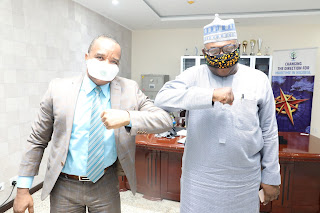… ‘Only Contributing Shipowners Eligible’
Ahead of a planned commencement of the disbursement of the Cabotage Vessel Financing Fund (CVFF), the Federal Government has set up a committee to develop guidelines for the distribution of the fund. Minister of Transportation, Rt. Hon. Chibuike Rotimi Amaechi, established the committee at a meeting on Thursday in Lagos with maritime stakeholders. He said the panel, selected from among shipowners, would review existing guidelines and come up with a workable document.
L-R: Minister of Transportation, Rt. Hon. Chibuike Rotimi Amaechi, President, WIMAFRICA, Mrs. Jean Anichere and Director-General, NIMASA, Dr. Dakuku Peterside, at the maritime stakeholders meeting on the guidelines for disbursement CVFF in Lagos on Thursday, January 23, 2020.
That was as the Director-General of the Nigerian Maritime Administration and Safety Agency (NIMASA), Dr. Dakuku Peterside, who was chosen as Chairman of the committee, said only shipowners, who are contributors to the fund, would be qualified to access the facility.
Amaechi stated, “We have looked at the old guidelines and we have seen that it will not be favourable to every party involved. Our commitment towards ensuring the disbursement of the CVFF remains unwavering, hence, the reason we are setting up this committee to look at the guidelines and come up with a workable one that will suit all parties involved.”
The Minister said part of the economic benefits of the disbursement of the fund would be creation of employment for Nigerians and enhancement of indigenous capacity in the maritime industry, which will help grow the Nigerian economy.
In his address at the forum, Dakuku disclosed that the CVFF had grown to $200 million (about N72 billion). He said only contributors to the fund will be eligible to access it.
Dakuku reiterated that the fund was meant to promote indigenous capacity in the shipping sector by assisting Nigerians in the procurement of maritime assets in line with the Cabotage Act, which seeks to encourage indigenous participation in the maritime industry.
He also disclosed that in addition to talks with the Central Bank of Nigeria (CBN) on how to make funds available to operators in the maritime industry, the Agency was working with the supervising Ministry to ensure that the CVFF was disbursed to qualified applicants using a single digit interest rate.
The Director-General said, “On our part as an Agency, our utmost goal is to grow the maritime sector and encourage more indigenous participation. We are working with the Ministry of Transportation and also discussing with the Central Bank of Nigeria, to see the possibility of granting loans to qualified operators at single digit interest rate, as this will give room for greater participation and also open up vistas of opportunities for massive job and wealth creation in the sector.”
He said NIMASA was working with stakeholders to ensure that the Cabotage Act was fully actualised through a Five-Year Cabotage waiver cessation plan set for implementation from next year.
Members of the CVFF committee, besides Dakuku, are Chairman, of Nigerian Ship Owners Forum, Mrs. Margaret Orakwusi; Vice Chairman, C&I Leasing, Emeka Ndu; Managing Director, Starz Marine, Engr. Greg Ogbeifun; and President, Nigerian Shipowners Association (NISA), Aminu Umar, among others.
The CVFF is meant to help Nigerians buy ships and other assets to grow their capacity, support economic growth, and compete favourably on the international scene.





















